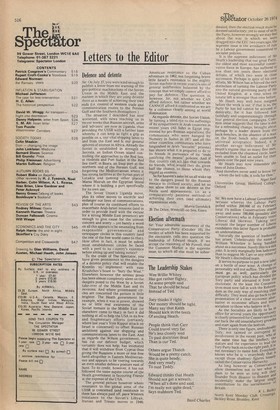Defence and detente
Sir: On July 27, you were kind enough to publish a letter from me warning of the geo-political machinations of the Soviet Union in the Middle East and the 521 manner in which they are using detente there as a means of achieving their own ends (i.e. control of western trade and communication routes to the Persian Gulf and the Southern Hemisphere.) The situation I described has now worsened, with news reaching us in recent weeks that Russian aircraft, arms and 'advisers' are now in Uganda, thus providing the USSR with a further base whereby it can keep as tight a grip as possble on a, our vital shipping lanes to and from the East and b, our general spheres of interest in Africa. Already the Soviet is established in strength in Socrata, an Indian Ocean island controlling the approaches to the Red Sea; in Hodeida and Port Sudan in the Red Sea itself; in Basra, an Iraqi port at the northern end of the Persian Gulf, not forgetting the Mediterranean where it has strong facilities at the Syrian port of Latakia and (among other places) Mersa Matruh on the Egyptian korai where it is building a port specifically for its own use.
The Soviet Union's Uganda move, plus its other moves to encircle and endanger our lines of communications, plus of course its continued efforts to exacerbate Arab-Israel tensions (and in order to provide itself with the excuse for a strong Middle East presence) are enough to give cause for the utmost concern and worry — yet barely a word on all this appears to be emanating from responsible governmental and newspaper circles in this country (and the rest of the free world come to that). How often in fact, it must be asked, must establishment circles be faced with a peril to its country's existence before sitting up and taking notice?
To the credit of The Spectator, you have given prominence to the dangers of a detente policy that will enable the Kremlin to implement with ease Krushchev's boast to "bury the West." Elsewhere however the serious press has been almost completely silent on the dangers posed to the West by a Soviet take-over of the Middle East and its environs. And where government circles are concerned the picture is little brighter. The Heath government for example, when it was in power, showed no or little real awareness of the Soviet menace in the Middle East (or elsewhere come to that): in fact it did nothing at all to help the USA in its few and fragmentary efforts (certainly where last year's Yom Kippur attack on Israel is concerned) to offset Russian ambitions against our shipping and communications lanes to the East. And as regards the Wilson government, it has cut our defence budget, which certainly does not help; has intimated that it will withdraw from Cyprus thus giving the Russians a more or less free hand altogether in Eastern Mediterranean and appears to be veering towards an even smaller defence posture east of Suez. To its credit, however, it has not followed the same supine course of the Heath government in favouring France at the expense of the USA.
The general picture however where resistance to the global aims of the USSR is concerned (and resistance to them has always paid off, pace Western resistance to the Soviet's Libyan, Iranian and Trieste moves in 1946; 523 524 527 527 522 543 American resistance to the Cuban adventure in 1962, not forgetting brave little Israel's resistance to the mighty Soviet machine in recent years) is one of general indifference bolstered by the concept that we simply cannot afford to pay for defence. The question is, however, Sir, not whether we CAN afford defence, but rather whether we CANNOT afford it confronted as we are by a collossus clearly aiming at world domination.
As regards detente, the Soviet Union, by turning a blind eye to the sufferings of its sympathisers in Arab countries in recent years (Ali Sabri in Egypt imprisoned for pro-Russian aspirations; the communists who were hanged by Numeiry in Sudan in 1971 and all the other countless communists who have languished in Arab "socialist" prisons) has shown what it is prepared to do to its • friends in pursuance of its "ends justifying the means" policies. And if that country can act like that towards its friends, what. would they do, given half the chance, to those whom they regard as enemies.
So for heaven's sake let us all wake up to the dangers posed by the Russian menace to civilised society, and let us not allow them to use detente as the Nazis used appeasement, i.e. as a comparatively painless method . of achieving their own (and ultimate) expansionist ends.
Morris Gershlick 29 The Drive, Westcliff-on-Sea, Essex










































 Previous page
Previous page